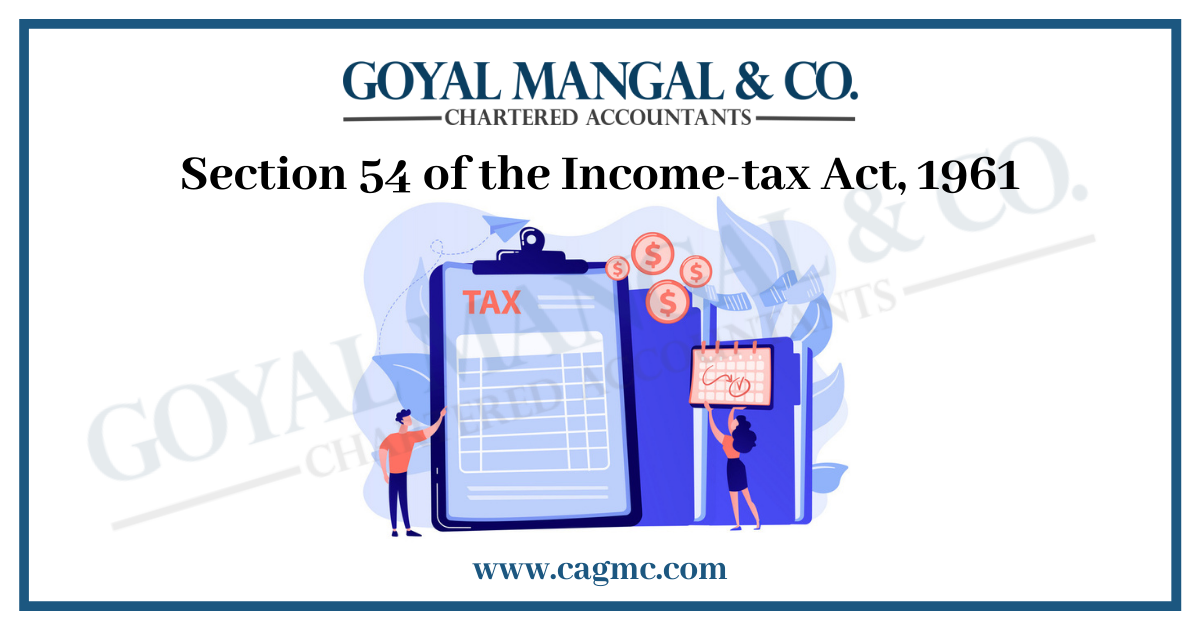
A man wanted to change his place of residence for some reason, so he sold his old house and bought another house with the sale proceeds. In this case, the purpose of the seller was not to make money by selling the old house but by getting another suitable house. Now, if the seller is liable to pay income tax on the capital gains of the old house, then it can be difficult for him. Section 54 provides relief from that difficulty. Section 54 assists a taxpayer who sells his or her residential property and with sale proceeds buy another estate. Let us discuss more section 54 of the Income-tax Act, 1961.
Section 54 of the Income-tax Act 1961
Section 54 benefits are available only to one person (individual) or HUF.
- The property to be transferred should be for long-term, residential property.
- Within one year before or two years after the transfer of the old house, the ratepayer must acquire another dwelling or build a new dwelling within three years from the transfer date of the precedent house. In case of a mandatory acquisition period, the period of construction or acquisition will be set from the date of receipt of compensation (original or additional).
Essentials under Section 54 of the Income-tax Act 1961
Under Section 54 of the Income-Tax Act, an individual or HUF who sells residential property may benefit from a tax exemption from capital gains if substantial profits are invested in the purchase or construction of the residential property.
Taxpayers such as corporate firms, LLPs, companies, or any other organization or body may not claim tax exemption under section 54. The conditions that must be met to obtain the benefits of the following category are as follows:
- The asset should be classified as a long-term financial asset
- The property for sale is the Residential House. Revenue from that house should be charged as Revenue from House Property.
- The seller must buy the house 1 year before the sale/transfer date or 2 years after the sale/transfer date. In the event the seller builds a house, the seller has a longer-term, i.e. the seller will be required to build a residential house within 3 years from the date of sale/transfer. In the event of compulsory acquisition, the period of acquisition or construction will be determined from the date of receipt of compensation (either initial or additional compensation)
- The new residence must be in India. The seller cannot buy or purchase a house abroad and demand exemption
Who is eligible to receive benefits under Section 54?
According to this section, when an assessee sells the residential property that is a long-term property and buys alternative residential house property, he or she is eligible to claim tax exemption.
Exemption available under Section 54 of the Income-tax Act 1961
The exemption amount under Section 54 of the Income Tax Act, 1961 will be the lower of the two for major long-term benefits i.e.:

What are the consequences if a new Property is transferred within 3 years?
If the assessee buys or builds a new house within the stipulated time after selling the old house property which is a major long-term property, he or she may apply for exemption under section 54.
If he wants to sell a new property of his own, one must hold that property for at least three years in terms of section 54. If he sells before the deadline the benefit given will be canceled and he will have to pay a higher interest rate exempt.
In that case, if the building of a new house is sold within three years of purchase/construction then two conditions are possible. To calculate taxes there are two conditions:
- If the cost of building a new house is less than the capital profit calculated for the sale of the original property of the house.
- In this case, the benefit of the money released during the transfer of the property will now be taxed and the cost of acquiring new assets will be considered zero.
Points to remember
- If the cost of the new accommodation is less than the proceeds of the original property auction, exemptions under Section 54F (which may be claimed for long-term profits by the sale of any property other than residential property) will be equally permitted. A person may re-invest the remaining amount under section 54EC within six months of the transfer to him under certain circumstances to save tax.
- If the cost of building a new house is less than the capital profit calculated for the sale of the original property of the house.
Final words
Section 54 of the Income Tax Act defines the benefits of exemption from the sale of residential property. This section allows for tax benefits on long-term capital gains made on residential sales. A person may claim this benefit by purchasing/constructing a new residence or by depositing the proceeds into the Capital Gains Account Scheme at any authorized bank.


